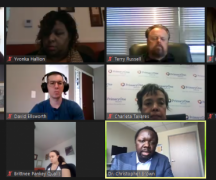By Susan Tebben
Ohio Capital Journal
The new year will bring new discussions on a law that prohibited abortions after a Down syndrome diagnosis.
A panel of judges for the 6th United States Circuit Court of Appeals set a new hearing date for March 11, and a briefing schedule starting Jan. 13 in the case pitting a Cleveland women’s health clinic and Planned Parenthood against the Ohio Department of Health and the State Medical Board of Ohio.

The case was filed in October to fight a law passed in 2017. (Correction: A previous version of this article mistakenly said this law was passed in 2018. It wasn’t. It was passed in 2017 and implemented in 2018. We regret the error.)
House Bill 214 prohibits anyone from performing or attempting to perform an abortion if the pregnant woman is “seeking the abortion, in whole or in part” because of a test, a prenatal diagnosis or “any other reason to believe” an unborn child could have Down syndrome, according to bill language.
A violation of the law would result in fourth-degree felony charges, the revocation of a physician’s medical license and finding the physician civilly liable for damages for anyone “who sustains injury, death, or loss that results from the prohibited abortion,” according to the Ohio Legislative Service Commission’s analysis of the bill.
A pregnant woman would be given criminal immunity under the law.
Earlier this month, a majority of the panel of 15 judges on the court voted for the case to be reheard, vacating the previous opinion and judgment of the 6th Circuit Court.
The state had asked the court to go over the case again, saying previous court cases had created tests for the constitutionality of abortion bans, and calling the procedures banned in the House Bill “eugenic abortions.”
“When society pursues the eradication of unborn children exhibiting a particular trait, it sends a message that people living with that trait are not as valuable as others,” the appeal stated.
In response to the request for a new hearing, two Ohio chapters of Planned Parenthood and women’s healthcare provider Pre-Term Cleveland said there was no need for a new hearing, because the decision doesn’t conflict with previous U.S. Supreme Court decisions on the matter, specifically 1973’s Roe v. Wade, which allowed abortion throughout the country.
“(The state does not) point to any evidence, nor could they, showing that women in Ohio are engaged in a campaign to eradicate people with Down syndrome, that they are choosing abortion for invidiously discriminatory reasons, or that they are being coerced by physicians into terminating wanted pregnancies after a Down syndrome diagnosis,” the argument against a new hearing stated.
The mandate in the case continues to be on hold until the case is heard again.





